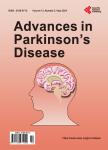Virtual games and quality of life in Parkinson’s disease: A randomised controlled trial
Virtual games and quality of life in Parkinson’s disease: A randomised controlled trial作者机构:Department of Neuroscience and Mental Health Faculty of Medicine Federal University of Bahia Salvador Brazil
出 版 物:《Advances in Parkinson's Disease》 (帕金森(英文))
年 卷 期:2013年第2卷第4期
页 面:97-101页
学科分类:1002[医学-临床医学] 100214[医学-肿瘤学] 10[医学]
主 题:Parkinson’s Disease Rehabilitation Nintendo Wii Quality of Life Physical Therapy
摘 要:Objective: To evaluate the efficacy of Nintendo Wii training in quality of life in Parkinson’s disease (PD) patients when compared to traditional physical therapy (PT). Methods: A randomized, single-blinded trial with 2 parallel arms was performed in a referral center for movement disorders in North-eastern, Brazil. Forty-four PD outpatients that fulfilled the eligibility criteria with mild to moderate motor impairment were randomized. Both groups executed a warm up session for 10 minutes that consisted of trunk flexion, extension and rotation, associated with upper and lower limbs stretching. The PT group followed a program that consisted of trunk and limb mobilisation, balance, muscle strengthening, rhythmic movement, postural alignment, double-task execution, bimanual tasks, and gait training. The Nintendo Wii group executed a sequence of tasks according to a previously established protocol, with similar training exercises. Duration of exercises was 40 minutes per session, 3 days per week for 4 weeks. The primary endpoint was the total score obtained in the Parkinson’s disease quality of life questionnaire (PDQ-39) translated from English to Brazilian Portuguese by Oxford outcomes. Secondary endpoints were the scores achieved by each group in the following domains of PDQ-39 scale: mobility, activities of daily living (ADL), emotional well-being, stigma, social support, cognition, communication and bodily discomfort. Assessments were performed before and after intervention in both groups with subjects in the “on period. Results: Subjects in the Nintendo Wii group showed greater improvement in the PDQ-39 total score when compared to PT group (p = 0.01). Also, significant differences were observed in ADL, stigma, social support and communication when comparing subjects before and after intervention in the Nintendo Wii group (p 0.05). Conclusions: The results achieved in this trial suggest that rehabilitation using Nintendo Wii may have beneficial effects in quali



